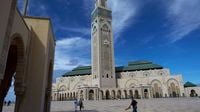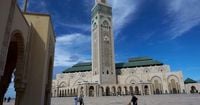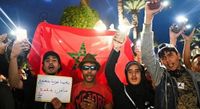On Friday, October 24, 2025, the scene in Morocco's mosques was strikingly uniform: imams across the country, from the bustling capital of Rabat to remote rural towns, delivered a government-scripted sermon urging parents to raise their children to be active participants in public life. The message, broadcast to more than 53,000 mosques and aired live on public television, came just weeks after an unprecedented youth-led protest movement, Gen Z 212, had shaken the nation to its core.
For the past month, Morocco has witnessed a groundswell of activism led by young people frustrated with rising costs for education and healthcare, as well as what they describe as an authoritarian government. According to the Associated Press, the movement—organized through social media platforms like Discord—has drawn thousands to the streets in cities such as Rabat, Casablanca, Agadir, and beyond. Their demands have been clear: improved social and economic conditions, better public services, and a government that listens.
Yet, this wave of protest has not come without consequences. The Moroccan Association of Human Rights (ADMH) reports that more than 1,500 people are facing prosecution for their participation in the demonstrations, with about 1,000 currently detained. Charges range from destruction of public property to organizing unauthorized protests and violence against security forces. In Agadir, the local court has been particularly active, sentencing 39 individuals to prison terms of six to fifteen years, and, according to local media, 33 defendants were handed a combined 260 years in prison for vandalism.
The government’s response has been two-pronged: a display of force through legal action, and a bid to recapture the narrative through the pulpit. The Friday sermon, delivered by imams dressed in traditional white djellaba robes, emphasized the importance of civic engagement. “One of the most important things we should care about is raising children to participate in the managing of public affairs (...) and participation in serving the nation, loving the homeland and watching over its security and stability,” said the imam in Rabat, his words echoing through the mosque and into homes via television. “A true citizen is the one who serves his nation and does it well.”
While the sermons did not mention the Gen Z 212 protests or the acts of vandalism, deaths, and arrests that have accompanied them, many worshippers and observers saw the timing and content as a clear message to the youth movement. As Dr. Driss El Ganbouri, a researcher specializing in religious affairs, put it to the Associated Press, “Friday sermons serve as a tool for practicing politics through mosques, whether to defend the state’s positions ... or to address other issues.” He added, “The state adopts a dual discourse toward citizens: one religious, and the other reflected through official decisions.”
Critics have long argued that government control over mosque sermons in Morocco—mirroring similar moves in Egypt and Saudi Arabia—is less about curbing extremism and more about promoting the state’s vision and policies. Preachers who stray from official messages risk punishment or dismissal, and the uniformity of the sermons is intended to reinforce national unity and stability.
But for many young Moroccans, the call for civic engagement rings hollow without real, tangible change. At a weekend protest in Casablanca, 18-year-old college student Soufiane (who asked not to use his last name for fear of retribution) told the Associated Press, “I sincerely hope the real purpose behind these sermons is to support young people’s participation in public affairs, not to guide or restrict them.” He added that while sermons could encourage positive engagement, they must be backed by “real and transparent action.”
That action, at least in part, was announced by government officials in response to the protests. In a Cabinet meeting chaired by King Mohammed VI, several new measures were unveiled to boost youth political participation and job opportunities. Among them: a draft bill to simplify election candidacy requirements for people under 35, and financial support covering up to 75% of campaign fees for young candidates. Observers quickly linked these measures to the content of Friday’s sermon, seeing them as an attempt to channel youthful energy into the formal political system.
Even more significant, the 2026 budget draft promises a record $15 billion (140 billion dirhams) for health and education, a massive increase over previous years. The government says it will create 27,000 jobs in these sectors, upgrade 90 hospitals, and improve the overall quality of education. King Mohammed VI himself announced on October 10 that social reforms would be accelerated, pledging an unprecedented 13 billion euros for healthcare and education improvements.
Yet, for Gen Z 212 and its supporters, these promises are not enough. In a statement shared on social media, the movement announced last-minute changes to protest gathering points in Casablanca and Oujda, urging participants to “adhere to the new gathering points and organizational instructions to preserve order and unity.” Their message was unwavering: “Thought cannot be suppressed, and the voice cannot be silenced.”
The protests, which resumed nationwide on October 25 and 26, have become a symbol of the growing demand for accountability and social justice in Morocco. Marchers have called not only for better healthcare and education, but also for stronger anti-corruption mechanisms and greater transparency in public institutions. Despite the government’s increased spending, Gen Z 212 argues that these measures are insufficient without “clear mechanisms to combat corruption and link responsibility with accountability.”
As the weekend demonstrations unfolded, their numbers appeared to dwindle—a reflection, perhaps, of protest fatigue, government pressure, or the chill of uncertainty. Only dozens turned out at Saturday’s gathering in Casablanca, a far cry from the crowds seen in previous weeks. The ADMH has called for the release of all detained protesters and demanded fair trials, as the movement’s leaders insist that genuine change will only come through systemic reform and the immediate release of peaceful demonstrators.
The Moroccan government, meanwhile, hopes its combination of financial investment, political reforms, and carefully worded sermons will be enough to restore calm and channel youthful discontent into productive avenues. Whether that strategy will succeed—or whether Gen Z 212’s call for deeper change will continue to echo through Morocco’s streets—remains an open question.
For now, Morocco stands at a crossroads, its future shaped by the voices of a new generation determined to be heard—and a government equally determined to manage the conversation.



